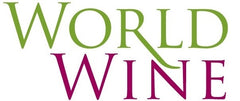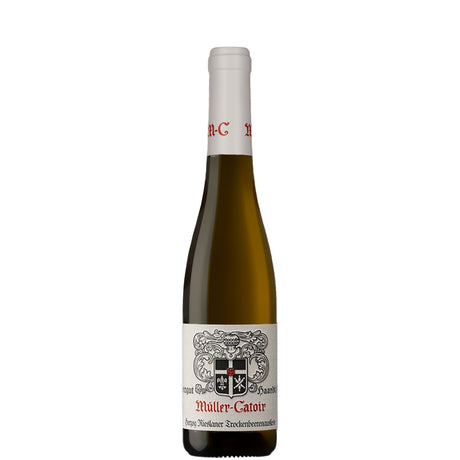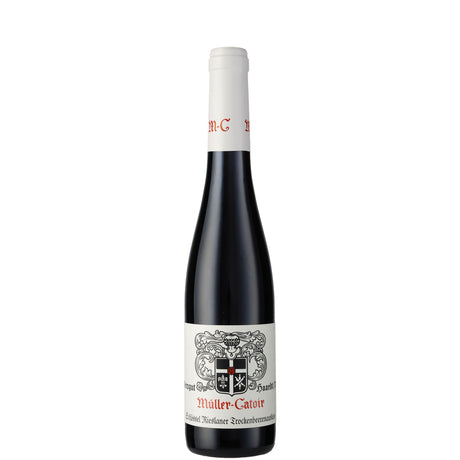Dr Loosen Wehlener Sonnenuhr Riesling Auslese 375ml 2022
$61.54Unit price /Unavailableor $56.99 in case of 12 bottles.Dr Loosen Ürziger Würzgarten Riesling Auslese 375ml 2022
$61.54Unit price /Unavailableor $56.99 in case of 12 bottles.Dr Loosen Graacher Himmelreich Riesling Kabinett 2022
$42.55Unit price /Unavailableor $38.95 in case of 12 bottles.Dr Loosen Riesling Eiswein 375ml 2021
$142.29Unit price /Unavailableor $133.70 in case of 12 bottles.Koehler-Ruprecht Saumagen ‘Auslese Trocken’ 2021
$134.85Unit price /Unavailableor $126.64 in case of 6 bottles.Koehler-Ruprecht Saumagen ‘Spätlese Trocken’ 2021
$91.53Unit price /Unavailableor $85.48 in case of 6 bottles.Koehler-Ruprecht Saumagen ‘Auslese Trocken ‘R’ 2017
$285.53Unit price /Unavailableor $269.86 in case of 6 bottles.Georg Breuer Pfaffewies Lorch 2021
$178.22Unit price /Unavailableor $167.91 in case of 6 bottles.Georg Breuer Berg Schlossberg Rüdesheim 2021
$246.04Unit price /Unavailableor $232.34 in case of 6 bottles.Dr. H. Thanisch 'Berncasteler Doctor' Riesling Spatlese 2022
$144.91Unit price /Unavailableor $137.66 in case of 6 bottles.Müller-Catoir Herzog Rieslaner Trockenbeerenauslese 285° 2017 (375ml)
$338.26Unit price /Unavailableor $321.34 in case of 6 bottles.Müller-Catoir Herzog Rieslaner Trockenbeerenauslese 2008 (375ml)
$357.52Unit price /Unavailableor $339.64 in case of 6 bottles.Staffelter Hof Paradies Riesling 2020
$35.00Unit price /Unavailableor $33.25 in case of 6 bottles.Strauch Rhinehessen Riesling Brut NV
$41.66Unit price /Unavailableor $37.50 in case of 6 bottles.Strauch Rhinehessen Blanc Pur Bio alcohol free NV
$22.48Unit price /Unavailableor $20.79 in case of 6 bottles.Corvers Krauter Riesling TERRA 50 QW Rheingau feinherb 2020 Dr. Corvers-Kauter
$38.33Unit price /Unavailableor $35.46 in case of 6 bottles.Gustavshof Rheinhessen Riesling feinherb 2021
$31.67Unit price /Unavailableor $28.50 in case of 6 bottles.Gustavshof Rheinhessen Riesling feinherb 2020
$31.67Unit price /Unavailableor $28.50 in case of 6 bottles.Gustavshof Rheinhessen Riesling Dittelsheim 2022
$31.67Unit price /Unavailableor $28.50 in case of 6 bottles.Gustavshof Rheinhessen Riesling Dittelsheim 2020
$31.67Unit price /Unavailableor $28.50 in case of 6 bottles.Corvers Krauter Riesling Erste Lage Oestricher Doosberg QW 2020
$63.32Unit price /Unavailableor $58.57 in case of 6 bottles.Corvers Krauter Riesling Berg Roseneck QW 2019
$45.00Unit price /Unavailableor $41.62 in case of 6 bottles.Corvers Krauter Riesling R3 QW Rheingau 2020
$41.66Unit price /Unavailableor $38.54 in case of 6 bottles.Corvers Krauter Riesling Grosse Lage Hasensprung Winkel Auslese 2018
$83.31Unit price /Unavailableor $77.06 in case of 6 bottles.
German Riesling is celebrated for its remarkable versatility and depth, showcasing an ability to express the unique characteristics of its terroir more so than many other white wines. Originating from Germany's steep river valley vineyards, particularly along the Mosel, Rhine, and their tributaries, Riesling grapes benefit from the cool climate German Riesling is celebrated for its remarkable versatility and depth, showcasing an ability to express the unique characteristics of its terroir more so than many other white wines. Originating from Germany's steep river valley vineyards, particularly along the Mosel, Rhine, and their tributaries, Riesling grapes benefit from the cool climate and mineral-rich slate soils. These conditions contribute to the development of the grape’s iconic vibrant acidity and complex flavor profiles. Riesling wines vary widely in sweetness, ranging from bone-dry to richly sweet. They are characterized by high acidity and aromatic flavors of green apple, peach, citrus, and at times, a distinctive petrol note that develops with age. The ageability of German Riesling is superb, with the best bottles able to mature gracefully for decades, evolving to gain honeyed and toasty complexity over time. This wide spectrum of styles makes German Riesling exceptionally food-friendly and a favorite for both casual drinking and special occasions. read more... less
























